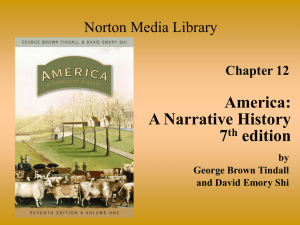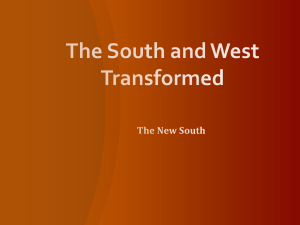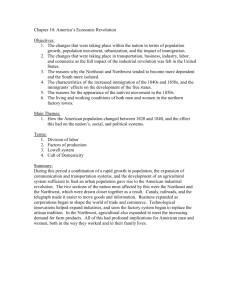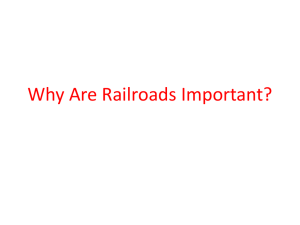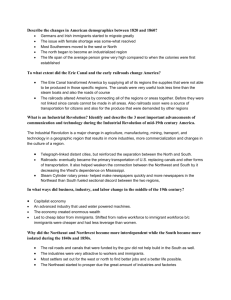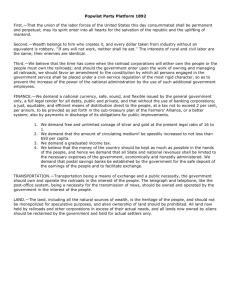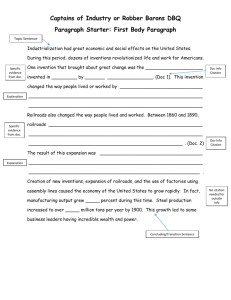UNIT 2 BUSINESS, LABOR & REFORM
advertisement
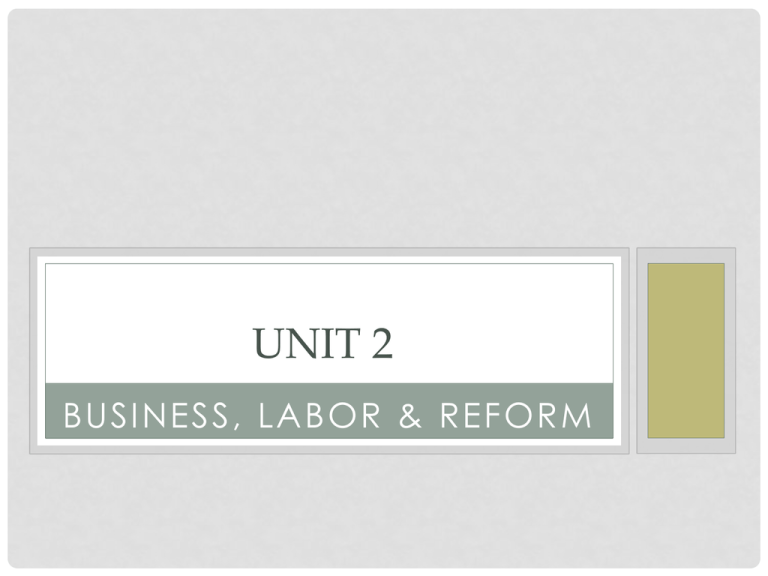
UNIT 2 BUSINESS, LABOR & REFORM ESSENTIAL QUESTION • How did GEOGRAPHY, TECHNOLOGY & ENTREPRENEURISM influence the development of American economic principles? • What does this mean?? • Define entrepreneurism • How do geography and technology influence what work is available? GUIDING QUESTIONS: • Why do people come to America? • As we expand West, why is technology important? • What role does the government play in the work environment? LEARNING TARGET 1: THE ECONOMIES OF THE AMERICAN COLONIES • All of these issues exist because of the type of economy we have. So we want to trace the development of our economy, starting with colonial times. • (Assignment 1) Types of economies: • • • • Traditional Command Market What type is Mercantilism? (Assignment 2) What are the regional differences in the colonial economies? LEARNING TARGET 2: ECONOMIC POLICIES IN A NEW NATION • Why would colonists tire of the mercantile system? • Once independence is declared....what next? • Remember the debate between the Federalists and Anti-Federalists? • How does this affect our economic system? • FEDERALISTS: are FOR • a STRONG national government, supported by a strong Constitution • ANTIFEDERALISTS: are FOR • a weaker national government, with more power given to the STATES • How will this debate affect what type of economy we have? SO WHO WINS THE DEBATE? QUESTION: WHAT TYPE OF ECONOMY WILL THE NEW NATION HAVE? • Answer questions from each of the following 3 sources to understand the issues facing the new nation: • Alexander Hamilton • http://www.ushistory.org/us/18b.asp • Thomas Jefferson • http://www.ushistory.org/us/18c.asp • How they disagree: • https://www.youtube.com/watch?v=notJuFGXQ9w HAMILTON'S LEGACY • "Necessary and proper" clause • "Implied powers" • together, these 2 ideas would have a HUGE impact on the gov'ts role in America • A National Bank (20 years) that would expand the money supply and extend credit (validating the new nation) • Regional differences: • Northerners supported (NYC, Phil, Boston/merchants/industry) • Southerners opposed (feared expansion of fed. gov't, power/wealth centered in the North) • Political Parties • Coinage SO WHO WON THE DEBATE? • Think back to learning target 1--what type of economy do we end up with? • Beginning in the 1790's, we have another Revolution....what is it? LEARNING TARGET 3: HOW DOES THE INDUSTRIAL REVOLUTION CHANGE AMERICA? • The canal age • This replaced the turnpike era- 1790-1820s • Steamboats were replacing slow barges • Steamboats increased the amount of nw corn and wheat and southern cotton to New Orleans • But the farmers and merchants wanted a faster route • Erie Canal connects Lake Erie to the Hudson River - very important for ny (350 miles long, 40 ft. Wide, 4 ft. Deep) pulled by horses • Canals were concentrated in the Ohio valley • Railroads • 3000 miles in 1840; 27,000 by 1860 • Government financing was key- mostly in land grants • Year-round access to goods; shipping times decrease (Chicago to New York was 3 wks now 2 days) • Telegraph • Follows the railroad and significantly improves that industry (schedules, delays, dangers) • 1861- ny to San Fran; 1866 ny to London • The factory • Interchangeable parts • We can now "finish products here" • Emergence of coal moves factories away from water sources OTHER IMPORTANT INNOVATIONS: • Goodyear vulcanized rubber in 1839 • Howe, then Singer with sewing machine in 1846 • Deere steel plow in 1847 • McCormick's reaper replaces the sickle, cradle and hand labor in 1834 ECONOMIC AND SOCIAL IMPACT: • Some social mobility • More geographic mobility • Fastest growing class was the middle classland was no longer the only indicator of wealth • Women benefited from the new cast iron stoves - no more open hearths • Middle-class diets change LT4: HOW DOES THE INDUSTRIAL REVOLUTION CAUSE SECTIONAL CONFLICTS IN THE 19TH CENTURY? • NORTH: • Industrial • Urban • More transportation routes, markets • SOUTH: • Agricultural • Rural • Less access (to goods, routes, markets) • WEST: • Manifest Destiny----freedom and land • Expanding territories statehood: slave vs. free • Sectionalism - after the United States proved itself by writing the Constitution and then weathering the War of 1812, America began to expand. And in doing so sectionalism began to show. • Sectionalism is when one shows (1) loyalty to your state or region, and (2) views problems from that sectional, rather than national, point of view. 1. INDUSTRIAL NORTHEAST • The factory began to take hold. Remember Hamilton's vision of an America of business, merchants, trade, banking, and lending. Entrepreneurs fuel money interests that are supported and protected by a strong national government. A. War of 1812 decreased trade with foreign countries, but that fostered domestic industrial growth B. Water power was available, then factories used Appalachian coal C. Farmhands move to the cities (mill girls and immigrants) D. Money was available to invest E. South and West were markets for the goods produced in the NE 2. PLANTATION SOUTH • Money is invested in land and slaves; cash crops rule - tobacco, rice, sugar, and most importantly cotton Why cotton? A. Cheap, fertile land of the southwest (expansion) B. The cotton gin C. Northeast and European markets Remember, most southerners are small farmers, not huge plantation owners 3. SMALL-FARM WEST • Immigrants and adventurers grow wheat, rye, corn, and produce meat A. Fertile lands are plentiful (expansion) B. Government promoted this by offering cheap land C. Northeast and European markets increase due to transportation and immigration LT 4: SECTIONAL DISPUTES •1. Protective tariffs (tax on imports to protect American production) - Northeast strongly for it - South is against it (ex: cotton) - West sides with North (mostly) •2. Second Bank of the United States - North strongly for it - South and West are against it •3. Internal improvements - West supports this - North supports the West - South is against it •4. Liberal land policy - West strongly favors this - North opposes this - South was divided • 5. Territorial expansion to the southwest - South favors annexing Texas and land from Mexico - North opposes expansion - West supports the South •6. Expansion of slavery - South favors this - North opposes POPULATION CENTERS • http://users.humboldt.edu/ogayle/hist110/America nCities.png LT 5: DOES THE RAILROAD PROMOTE AMERICAN UNITY AND ECONOMIC GROWTH? • In other words, were the railroads a good thing for America? • Primary Source activity: • Doc 1: Thoreau--a Transcendentalist, on Walden Pond, contemplating life and nature and values • Doc 2: Mackay--a British journalist/lawyer writing about the linking of East and West through the railroads • Doc 3: Kennedy--census taker explaining the growth and progress of railroads through 1860 • Doc 4: Map--depicting growth of railroads HOW THE RAILROADS CHANGE AMERICA: • Connected interests of the East and the West ("iron bonds") • a market for every citizen: cheap goods • transportation accessible to all • land to cultivate (CHEAP land, for that matter) • land grants to railroad companies (200 mill acres) • the "great civilizer"?? The impact on Native Americans WHO BUILT THEM? • Union Pacific: Irish immigrants • • • • • dangerous, sometimes monotonous job little in the way of entertainment (Hell on Wheels) no personal hygiene, tight quarters, poor conditions Native American troubles got paid more than the Chinese • Many veterans went to work the rails; sometimes, the system was like an army in terms of precision and production • Central Pacific: Chinese immigrants • • • • recruited to take the place of protesting Irish workers worked hard, at a lower wage punctual, well behaved better diet (fewer diseases) LT 6: THE MEN WHO BUILT AMERICA • http://www.youtube.com/watch?v=gR7oHh-fXUw • What these Titans, these "Captains of Industry" and "Robber Barons" had in common • "Vision without execution is hallucination." • But just as important to remember: upon whose labor was America built?? GREAT REVIEW FOR UNIT 2 • http://users.humboldt.edu/ogayle/hist110/unit3/poli tical.html • READ THIS!
